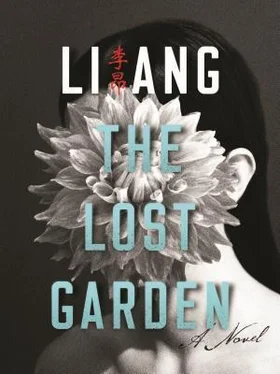He continued with self-assurance:
“Most importantly, Mr. Zhu, an avid amateur photographer, photographed every step in the renovation process, thus keeping a record of the old artisans’ work and leaving valuable information for future generations. Moreover, thanks to Mr. Zhu’s hobby, we have pictures of every detail and bit of scenery of the garden, which have enabled us to repair, with precision, major damage caused by weather and humans over the past three or four decades. Using his photographs as a basis, we are now able to present to you a completely restored garden. Which is why I said there would be no Lotus Garden without Mr. Zhu.”
Applause erupted from the audience after a few seconds of silence. Tears began to well up and continued to stream down the face of Zhu Yinghong, who was sitting under a coral tree.
Lin Xigeng, who was next to her, took out a linen handkerchief and handed it to Yinghong, who used it cover her mouth and nose, though she couldn’t stop sobbing.
After the brief description of the garden, the guests set out on a tour, led by the relic-restoration expert, who brought everyone back to the entrance with its arch. He gave a detailed explanation of the different parts of the garden, which could be reached by three separate paths — by following the water, by crossing the man-made hill in the middle, or by walking down the winding loggia to the first structure, Square Kiosk. He looked up at the sky before making a choice for the guests:
“It’s quite hot outside, so let’s take the loggia to Long Rainbow Lying by the Moon. After we finish, we can go boating in Lotus Pond under a setting sun.”
As they walked into the loggia, the rocks, hill, and vegetation on the right blocked the view of the lotus pond, limiting their movements to within the posts and pillars of the loggia, but a few exquisite turns and several stone steps later, they were greeted by a lily-scented breeze blowing through an ornamental hexagonal window that framed a corner of Yinghong Pavilion. They could see the pavilion’s magnificent eaves with delicate upward curves, contrasting with willow branches that swayed in the wind. The giant lily flowers in the pond seemed to be leaping out of the water to hug stone pillars by the pavilion. Even from a distance they could make out the inked couplets in free-style calligraphy on the pillars:
In a quiet little garden, startled geese soared into the sky with the wind ,
On the boundless green leaves, feathered friends frolicked in shadows of red
Some of the guests cried out in admiration.
Continuing on their crisscrossing journey through the garden, they stopped to admire the banana shrubs and firecrackers flowers, with the explosion of tiny clusters of red blossoms. Then they climbed to the second floor to check out the octagonal courtyard, with its skylight, followed by a hike to Sea-gazing Tower to gaze at the distant horizon, where the sky met the ocean. They also got to read the poems left by literati on the loggia and admire the exquisite dragon carved on the doors and partition walls. After watching mandarin ducks splashing in the water, they found themselves trapped between man-made forests and hills. Many stops later they finally arrived at Fascination Scene Stage.
Separated by water and twenty feet from Yinghong Pavilion, Fascination Scene Stage opened on three sides and was encircled by short railings spaced between posts. Behind it was a towering wall with two ornamental doors featuring literary and military themes.
The play that had been put on at lunchtime was long over, so the guests went up onto the stage to examine the double-sided carved screen wall. The front presented Chen San and Wuniang , a drama that had been in circulation for centuries. Regardless of their chronological appearance in the play, all the characters were painted on the six-foot-high wall: beautifully dressed Wuniang and her alluring maid high up in her private residence; Chen San, who had sold himself into bondage to be with her, standing next to a broken mirror; Wuniang’s enraged father being soothed by her mother. The only exception was Ma Jun, who would later come to carry Wuniang off in a sedan chair; he was standing to the side, slowly waving his fan, for he wouldn’t be on stage for a while yet.
The rousing play was etched on the front side of the screen, while the backside was carved with slender window lattices to hint at the notion of “nothing in and nothing out,” which, with light pouring in through the lattices, highlighted the similarity of the play to human life.
After viewing the screens, some among the guests sensed something stir on the other side, but forgot they were on a stage until they turned around to see Yinghong Pavilion across from them, lined up with chairs from the earlier performance.
With the pond before them, they could still see the Cape lilacs by the pavilion, where the late-blooming plants blanketed the trees with tiny white flowers. The Cape lilacs seemed to be all stamens and pistils; with no solid petals, the flowers looked dispersed and illusory. The many white flowers were like layers of misty clouds and fog over Yinghong Pavilion, as if ready to descend and surround the small structure and make everything vanish without a trace.
Under the hazy, melancholic Cape lilac flowers, the guests slowly came to Flowing Pillow Pavilion, recently renamed Zhu Zuyan Memorial Hall, its original furnishing intact and the photos he’d taken hanging on the walls.
Scenes in the black-and-white photographs, which had been carefully stored away, were still clearly visible, though somewhat yellowed. By contrast, the colored photos, which had been sent for development in Japan, surprisingly showed little change in color and quality. Lotus Garden’s predominately indigo tone was elegantly reproduced over and over on the woodwork, giving the visitors an illusion that nothing had changed after so many years and that everything would continue the way it was for ages to come.
Locked inside a large, purple sandalwood cabinet that had been fitted with glass doors were two hundred and thirty-two cameras, alongside two hundred and fifty-four lenses; on the wooden shelves of a large new cabinet were forty-seven stereo systems, accompanied by speakers of various size, turntables, and amplifiers.
Naturally, another round of amazed cries erupted, intermingled with whispers among the guests.
They left Flowing Pillow Pavilion and continued on the tour, traversing narrow spaces created by walls, buildings, small bridges, embankments, winding loggias, and ponds. Unable to take in the whole garden in one view, they spent three hours on the tour, one in which each step afforded them a new sight and each turn opened up a new vista.
Some guests hung around; Lin Xigeng, who was taken by members of Lucheng gentry and officials to survey local construction and potential real estate investments, did not return to Lotus Garden until after the sun had set.
Dinner was served in the banquet hall in Lotus Tower, with a nonfunctional kitchen, so the food, simple daily fare, was brought over from the Upper House. The aging Mudan, who remained table side to serve, was no longer capable of doing any household chores, so she supervised two female helpers and continued to be in charge this time when she returned to Lotus Garden with Yinghong. The similarly ancient Luohan, observing the old rules and absenting himself during mealtime, was sent by Mudan to wait outside Lotus Tower, where he would spring into action when needed.
Yinghong and Xigeng sat on opposite sides of a large, round rosewood table in the main hall. Still feeling excitement from the tour that afternoon, he talked animatedly about Lucheng. Yinghong, now tired, was not paying much attention when he abruptly changed the subject:
Читать дальше












